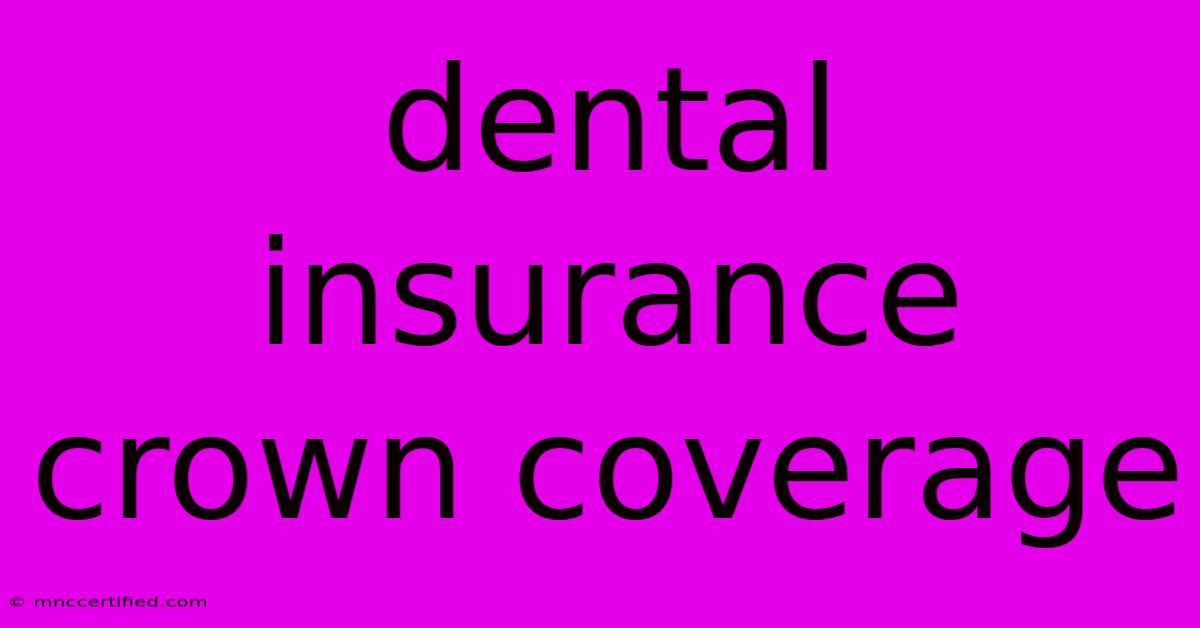Dental Insurance Crown Coverage

Table of Contents
Dental Insurance Crown Coverage: A Comprehensive Guide
Understanding your dental insurance crown coverage can save you significant money and prevent unexpected dental bills. Crowns are a substantial investment, so knowing what your plan covers is crucial before undergoing this procedure. This comprehensive guide will delve into the intricacies of dental insurance and crown coverage, helping you navigate the process with confidence.
What is a Dental Crown?
Before diving into coverage specifics, let's define what a dental crown is. A dental crown, also known as a cap, is a tooth-shaped covering placed over a damaged tooth to restore its shape, strength, and appearance. They're often used to treat teeth with significant decay, fractures, or after root canal therapy. The material can vary (porcelain, ceramic, metal), impacting both the aesthetic appeal and the cost.
Understanding Your Dental Insurance Policy
Your dental insurance policy is a contract outlining the coverage you receive. The specifics of crown coverage vary widely depending on your plan:
- Premium: The monthly fee you pay for your insurance.
- Deductible: The amount you pay out-of-pocket before your insurance begins to cover expenses.
- Annual Maximum: The maximum amount your insurance will pay towards dental expenses in a year.
- Waiting Periods: Some plans have waiting periods before major procedures like crowns are covered.
- Coverage Percentage: This specifies the percentage of the cost your insurance will cover after meeting your deductible. For example, a 80/20 plan means you pay 20% and your insurance covers 80%.
Key Terms to Know:
- In-Network vs. Out-of-Network Providers: Using an in-network dentist usually results in lower out-of-pocket costs, as their fees are pre-negotiated with your insurance company. Out-of-network dentists may charge more, and your insurance reimbursement might be less.
- Pre-authorization: Many plans require pre-authorization from your dentist before proceeding with a crown. This involves submitting a treatment plan to your insurance company for approval. Failure to obtain pre-authorization could significantly impact your coverage.
- Limitations and Exclusions: Carefully review your policy for any limitations or exclusions regarding crown coverage. Some plans might only cover crowns under specific circumstances, such as after a root canal.
Factors Affecting Crown Coverage
Several factors influence how much your insurance covers:
- Type of Crown: The material used for your crown affects the cost. Porcelain crowns are generally more expensive than metal crowns, but they offer a more natural look. Your insurance might cover different materials at different rates.
- Medical Necessity: Your insurance company needs to determine that the crown is medically necessary. This usually involves a thorough examination by your dentist to justify the procedure. Cosmetic reasons alone might not be enough for full coverage.
- Pre-existing Conditions: If you have pre-existing conditions affecting the tooth requiring a crown, your coverage might be impacted.
Maximizing Your Dental Insurance Benefits for Crowns
To get the most out of your dental insurance for crown coverage:
- Choose an In-Network Dentist: This will help you avoid higher costs and ensure smoother claims processing.
- Understand Your Policy: Read your policy carefully to understand your coverage limits, deductibles, and waiting periods.
- Obtain Pre-Authorization: Always get pre-authorization before proceeding with the crown procedure to avoid unexpected bills.
- Ask Questions: Don't hesitate to ask your dentist and your insurance provider questions about your coverage.
- Compare Plans: Before committing to a dental insurance plan, compare different options to find the best coverage for your needs.
What to Do if Your Crown Isn't Fully Covered
If your insurance doesn't fully cover the cost of your crown, explore options like:
- Payment Plans: Many dentists offer payment plans to help you manage the cost of treatment.
- Dental Financing Options: Third-party financing companies provide loans specifically for dental procedures.
- Savings Accounts: Consider using savings or emergency funds to cover the remaining cost.
Conclusion: Proactive Planning is Key
Understanding your dental insurance crown coverage is crucial for effective financial planning. By carefully reviewing your policy, communicating with your dentist and insurance provider, and exploring available options, you can minimize your out-of-pocket expenses and maintain optimal oral health. Remember that proactive planning and careful communication are key to a successful and affordable crown procedure.

Thank you for visiting our website wich cover about Dental Insurance Crown Coverage. We hope the information provided has been useful to you. Feel free to contact us if you have any questions or need further assistance. See you next time and dont miss to bookmark.
Featured Posts
-
Loss Of Rental Income Insurance
Nov 24, 2024
-
Auto Insurance Anderson Indiana
Nov 24, 2024
-
Motorcycle Insurance No License
Nov 24, 2024
-
Brentford Holds Everton After Red Card
Nov 24, 2024
-
Affordable Insurance Milford Ma
Nov 24, 2024